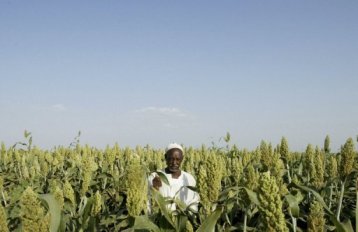Sudan seeking to curb wheat imports through domestic production
June 4, 2013 (KHARTOUM) – The Sudanese minister of agriculture Abdel Halim Al-Mutafi said that Sudan wants to curb the 1.5 million tons of wheat imported annually by encouraging domestic production.

Al-Mutafi expressed hope to reduce imports by having the government continue offering competitive prices to local farmers that would push them to bolster wheat production instead of sorghum and beans.
He noted that farmers prefer to grow crops which are more profitable than wheat, adding that price of a bag of beans is three times the price of a wheat bag .
Sudan’s annual consumption of wheat is around 2 million tons.
He told reporters that Sudan does not face a shortage in grain supply, adding that the necessary funding for the purchase of wheat is available.
But last month, Al-Mutafi, who was testifying before the parliament, acknowledged that there is a serious shortage in agricultural finance, saying that last year’s allocated funds did not exceed 2.5 billion pounds (SDG) which represents only 2% of the total loans extended by the banks nationwide.
In the same testimony he questioned the possibility of achieving self-sufficiency and poverty alleviation, explaining that Sudan’s imports of food products exceed $1 billion, while spending on agricultural activities does not exceed a mere $600 million saying he expects a grain shortage of up to 76 thousand tonnes this year.
Once hoped to be the breadbasket of the Arab world, Sudan’s agricultural sector has continued to deteriorate over the years mainly as a result of negligence, drought, mismanagement, high taxes and the overall economic climate.
Sudanese farmers often complain about the high costs of imported materials such as fertilizers. Many of them were sent to jail as their debt piled up.
Several ambitious plans enacted to bring life to the sector have failed to materialize and critics say the government forfeited a golden opportunity during the oil boom to boost agriculture.
Foreign investors also complain about lack of infrastructure and unfriendly laws which they say deters them from putting money in Sudan’s vast farmlands.
Last month a Saudi investment firm said it will hold off its planned agricultural project in Sudan to produce wheat and other basic food items until the government eases a ban to repatriate profits.
Sudanese officials say that they are refocusing on agriculture as part of the broader economic plan to find alternatives to oil.
(ST)
